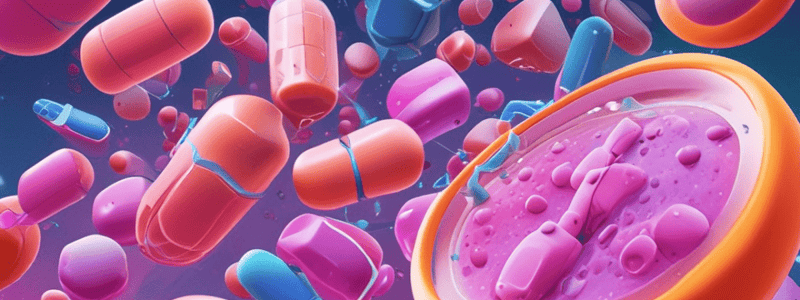Podcast
Questions and Answers
What is the primary mechanism of action of chemotherapeutic agents?
What is the primary mechanism of action of chemotherapeutic agents?
- Damaging the DNA of cells
- Stimulating the immune system to attack cancer cells
- Reducing the size of the tumor directly
- Interfering with the cells' replication process (correct)
Which body systems are most affected by the side effects of chemotherapy?
Which body systems are most affected by the side effects of chemotherapy?
- Nervous and endocrine systems
- Musculoskeletal and integumentary systems
- Cardiovascular and respiratory systems
- Hematopoietic, hair follicle, and GI systems (correct)
Which of the following is NOT a common side effect of chemotherapy?
Which of the following is NOT a common side effect of chemotherapy?
- Thrombocytopenia
- Leukopenia
- Alopecia
- Hyperglycemia (correct)
What is the primary risk associated with a reduction in the number of circulating white blood cells (WBCs)?
What is the primary risk associated with a reduction in the number of circulating white blood cells (WBCs)?
Which class of drugs is commonly used to treat the nausea and vomiting associated with chemotherapy?
Which class of drugs is commonly used to treat the nausea and vomiting associated with chemotherapy?
What is the purpose of administering epoetin alfa (Procrit) in patients undergoing chemotherapy?
What is the purpose of administering epoetin alfa (Procrit) in patients undergoing chemotherapy?
What is one of the most common complications of chemotherapy, leading to severe swallowing problems and systemic infections?
What is one of the most common complications of chemotherapy, leading to severe swallowing problems and systemic infections?
Which area is particularly mentioned for bacterial growth and requires cleaning twice a day with soap and water?
Which area is particularly mentioned for bacterial growth and requires cleaning twice a day with soap and water?
What should be avoided in neutropenic patients to reduce the risk of urinary tract infections?
What should be avoided in neutropenic patients to reduce the risk of urinary tract infections?
How do neutropenic patients with lung infections differ in clinical manifestations from typical patients?
How do neutropenic patients with lung infections differ in clinical manifestations from typical patients?
What patient teaching is important to prevent hair loss related to chemotherapy treatment?
What patient teaching is important to prevent hair loss related to chemotherapy treatment?
What should be prescribed to prevent straining in patients experiencing chemotherapy-induced constipation?
What should be prescribed to prevent straining in patients experiencing chemotherapy-induced constipation?
Study Notes
Chemotherapy Actions and Uses
- Chemotherapy drugs reduce the size or slow the growth of cancer by interfering with cells' replication process.
- These drugs damage cells and cause cellular death, affecting both malignant and normal cells.
Common Side/Adverse Effects
- Rapidly multiplying cells (hematopoietic system, hair follicles, GI system) are affected the most.
- Side effects include thrombocytopenia, leukopenia, weight gain, alopecia, nausea, and vomiting.
- Nephrotoxicity is a common adverse effect, and some patients experience mental changes (chemo brain).
Treatment of Common Side Effects
- Nausea and vomiting can be treated with antiemetic medications like prochlorperazine, granisetron, and ondansetron (Zofran).
- Epoetin alfa (Procrit) can help raise erythrocyte counts to correct anemia.
Nursing Interventions for Cancer Therapy
- Assess the mouth for stomatitis, a common complication of chemotherapy, to prevent swallowing problems and systemic infections.
- Assess the skin for rashes or eruptions, and ensure cleanliness in skinfolds to prevent infection.
- Administer drugs orally whenever possible, and limit subcutaneous or intramuscular injections.
- Assess pulmonary function, urinary and bowel function, and watch for signs of infection.
Patient Teaching
- Emphasize the importance of gentle mouth care, skin moisturizing, and gentle shaving.
- Encourage deep breathing, coughing exercises, and activity to prevent respiratory complications.
- Educate patients about potential hair loss and provide resources for scalp protection and hair care.
Studying That Suits You
Use AI to generate personalized quizzes and flashcards to suit your learning preferences.
Description
Test your knowledge on chemotherapy drugs and their actions, uses, and common side effects. Learn about how these drugs interfere with cell replication, affect both malignant and normal cells, and impact rapidly multiplying cells in the body.



